Davis Cup final: Buster Mottram & story of Britain's 1978 campaign
- Published
Davis Cup final: Belgium v Great Britain |
|---|
Venue: Flanders Expo, Ghent Dates: 27-29 Nov |
BBC coverage: Watch on BBC television, BBC Sport website, Connected TVs, tablets, mobiles and app. Listen on Radio 5 live and 5 live sports extra. Full details. |
A National Front sympathiser was the best player, team members rowed in public and their own fans pelted them with flour - Great Britain's run to the 1978 Davis Cup final was anything but dull.
This week Andy Murray leads his nation's attempt to win the sport's premier team competition for the first time since 1936.
The only occasion they have come close in the intervening 79 years was at a time of turmoil in Britain, with widespread public sector strikes and the Labour government of James Callaghan close to collapse.
A team of disparate and occasionally volatile characters - the brilliant but divisive Buster Mottram, chalk-and-cheese brothers John and David Lloyd, and veteran doubles specialist Mark Cox - came together to win five ties before losing to a John McEnroe-inspired United States.
The Lloyd brothers and team captain Paul Hutchins reveal the extraordinary highs and lows of that memorable campaign 37 years ago, which began with their best player exiled from the squad.
'Buster is a tragic tennis case'

Buster Mottram receives a police escort at Wimbledon in 1978
Despite being British number one, Mottram had not played Davis Cup for 18 months after falling out with Hutchins at Wimbledon in 1976, following criticism from the coach.
"Buster never used to like grass courts and I felt he didn't try or there was something he did at Wimbledon and I was particularly upset about it," Hutchins recalled. "He then got upset with me and refused to play with me or under me."
In January 1978, it was suggested Mottram wanted Hutchins replaced by three-time Wimbledon semi-finalist Roger Taylor. John Lloyd, then 23 and Britain's number two singles player, threatened to go on strike if Mottram had his way, suggesting "Britain will find herself with a one-man team".
"He has gone too far this time, even by his own standards," the younger Lloyd told the Daily Express. "He is a tragic tennis case... one of those players who thinks he's bigger than his country; bigger than everything.
"It's ridiculous. It's like Kevin Keegan saying he won't play for England under Ron Greenwood."
David Lloyd, then 30, described Mottram as "a hopeless team man".
But despite the ill-feeling, within a month Hutchins and Mottram had settled their differences and Britain's best player agreed to return to the squad.
Mottram - 'the Geoff Boycott of tennis'
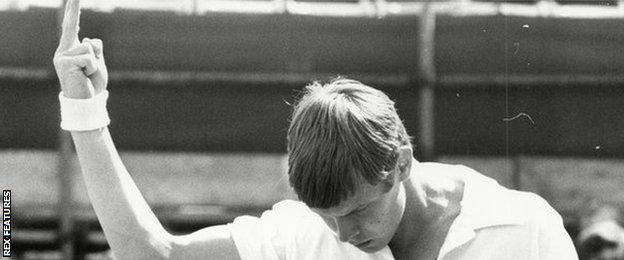
Buster Mottram giving the V-sign to the crowd after his win over Colin Dowdeswell at the National Hardcourt Championships in Bournemouth in May 1975
The son of tennis players Tony Mottram and Joy Gannon, Christopher 'Buster' Mottram attracted much controversy off the court. He was only 22 but not shy in expressing his political views, and was linked to the far-right National Front, then a growing force within British politics with race a tinderbox issue.
It alienated him from sections of the British public and Hutchins attempted, unsuccessfully, to persuade Mottram to distance himself from the party.
"What I felt then and what I still feel is it was just silly of Buster to have got involved but, equally, the political side used Buster for all that they could get from him. What he thought was a small thing suddenly became a big thing," Hutchins said.
John Lloyd said Mottram enjoyed provoking reactions. "One year Buster sent a telegram to support [Conservative Prime Minister] Margaret Thatcher over something to do with the unions. It was sent on behalf of the British Davis Cup team. It got out into the press and the LTA had to apologise for it.
"He would make comments with a smile on his face and I don't think he really meant them. He was just a bit quirky and a bit nuts."
His brother David added: "Buster was the Geoff Boycott of tennis, very individual and he wanted to win for himself. When Boycott batted he wanted to bat all day and the things around him didn't matter. That's difficult when you're in a team event but we had to support Buster because he was so good.
"Once he was in the team environment on the court, he changed. I think he came around more to us, which was great. He did perform well and we had some laughs. He was a nutcase but a great player."
More Davis Cup and tennis stories |
|---|
'Buster stays in a different hotel or I'm not playing'
Britain's first Davis Cup tie in 1978 was in Monaco in March. Mottram travelled with the squad but a back injury prevented him from playing, so current All England Club chief executive Richard Lewis filled the second singles berth alongside John Lloyd.
A 5-0 victory brought a perfect start, while David Lloyd enjoyed a big win in a Monte Carlo casino, which he considered a sign that Britain would go on to win the competition. His team-mates chuckled at his optimism.
A week before GB faced Austria in Bristol in June, the Lloyd brothers played Mottram and Australian Phil Dent in a doubles match at Beckenham that descended into rancour as David Lloyd and Mottram argued on court.
Mottram had been warned by the umpire for taking too long between points, and following another delay, David Lloyd urged him to get on with the game. But Mottram approached the net and told the elder Lloyd: "Stop complaining. You can't tell me what to do. You're not really good enough to be in this Davis Cup team."
A furious Lloyd said he would not play against Austria unless Mottram stayed in a different hotel. An unrepentant Mottram retorted: "I won't apologise because I haven't done anything wrong. David is sensitive because he knows I am speaking the truth. He started the verbals, not me."
Great Britain's 1978 Davis Cup run |
|---|
March: Beat Monaco 5-0 (a) |
June: Beat Austria 5-0 (h) |
July: Beat France 3-2 (a) |
September: Beat Czechoslovakia 5-0 (h) |
October: Beat Australia 3-2 (h) |
December: Lost to United States 4-1 (a) |
Flour bombs, 'Nazi' banners and hugs
Hutchins, who was "trying to keep the ship together", acted as peacemaker between his players and the rift was healed as Mottram prepared to play his first Davis Cup tie in two years. But not everyone was pleased to see him representing Britain again.
Demonstrators descended on the Bristol Tennis and Squash Centre carrying banners saying 'Heil Adolf Mottram', 'Facist pig' and 'Buster Mottram is a Nazi'. A man with a loudhailer urged spectators to barrack Mottram on the court.
John Lloyd said the players had to travel to the venue via different routes to try to avoid the protests, while David Lloyd recalled "we were bombarded by flour bombs".
Mottram did not flinch, winning his first singles rubber for the loss of just six games before teaming up with David Lloyd to win the doubles in five sets and secure victory for Britain. Just a week after their bitter row, the pair were hugging each other on court.
"It was typical Buster," noted David Lloyd. "He was a bit like me - when things were against him, he attacked rather than defended so he had a bit of a war against the flour-bombers."
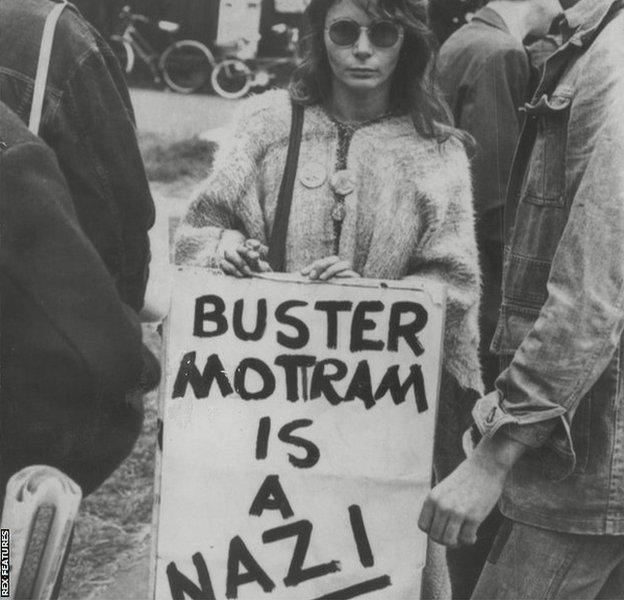
A woman holds a 'Buster Mottram is a Nazi' banner during Britain's Davis Cup tie against Austria in Bristol in 1978
Baiting the Parisians, beating the Czechs
Mottram was unusual among British players in preferring to play on clay rather than grass. His prowess on the slower surface helped Britain beat France at Roland Garros shortly after Wimbledon, defeating future French Open champion Yannick Noah while the Paris crowd tried to unsettle him.
David Lloyd recalled: "There was a guy in the stands who had beer and cola cans tied to a string. Every time Buster served, he dragged the cans down the steps.
"Instead of getting cross, Buster went to the guy, pretended he was a conductor and encouraged him to do it more. On purpose, he got the full Roland Garros against him. That's what Buster was like - he wanted that. He played unbelievable tennis and he won."
John Lloyd then beat Eric Deblicker in five sets with elder brother David offering his own brand of encouragement. "Unfortunately John would get cramp, sometimes in his head. He got it in the fifth set and looked like he was going to tank it and lose," David said.
"We had to go the side of the court and shout and scream at him. As luck had it, Deblicker got real cramp, John's cramp miraculously went away and he went on and won."
After a doubles defeat for the Lloyds, Mottram beat Deblicker in straight sets to take Britain through to the European Zone A final against what was then Czechoslovakia, at Eastbourne in September.
The Czechs gave a debut to an 18-year-old Ivan Lendl, who would go on to win eight Grand Slam titles and coach Andy Murray to his greatest triumphs. Three of the rubbers went to deciding sets but Britain won the tie 5-0 to set up a home semi-final against Australia.

John Lloyd's attitude didn't always meet with the approval of elder brother David (right)
'It was a choice between three ugly guys and Chris Evert. I picked Chris'
Australia, who have won the Davis Cup on 28 occasions, second only to the United States, were reigning champions and favourites when they faced Britain at Crystal Palace in October.
The hosts' preparations for a tie staged in an intimate 2,700-capacity venue - the LTA had not envisaged Britain would get that far and had failed to reserve a bigger arena - were not helped by a love-struck John Lloyd arriving three days late after beginning a romance with women's number one and his future wife, Chris Evert.
"I was in Boston with Chris and instead of meeting the team on the Saturday in England I didn't show up until Monday night or Tuesday," he recalls. "Everyone in the team, including my brother, was not happy - quite rightly.
"It was a question of being professional and being with three ugly guys, or being with Chris, and I picked Chris."
Lloyd practised poorly, which he said was normal, and then lost the first 10 points of his match against John Alexander before suddenly striking form and "playing one of the best matches I've ever played, considering the pressure situation".
Lloyd won 7-5 6-2 6-2, while an inspired Mottram beat Tony Roche 8-6 3-6 7-5 6-4 in "the best match I've ever played".
David Lloyd and Mark Cox were underdogs against the 1977 Wimbledon doubles champions Ross Case and Geoff Masters but a four-set win took Britain through to their first Davis Cup final in 41 years amid scenes of wild celebration. Mottram poured champagne over Cox and David Lloyd, who ran around the arena with the Union Jack.
The euphoria was dampened by the United States beating Sweden in the other semi-final. A Swedish victory would have meant the final was played in Britain, but a five-set doubles defeat for Bjorn Borg and Ove Bengtson was decisive as the US took it 3-2.
"We were hoping and praying that Sweden would beat America," said David Lloyd. "Playing America in America and those guys was a much, much harder match."

John Lloyd and Evert, pictured in October 1978, got married the following year
Mission impossible in Mission Hills
"Those guys" included a precocious 19-year-old John McEnroe, already nicknamed 'Superbrat' in the press for his on-court antics, making his Davis Cup singles debut.
The British squad hoped the New Yorker might be afflicted by nerves when the final was played at Mission Hills Country Club in the desert city of Palm Springs, California, in December.
But on a specially-prepared, ultra-fast court "which meant it was like playing on glass", McEnroe beat John Lloyd and Mottram in singles, losing only five games to each of them.
"It was almost a privilege to be on court against him," said the younger Lloyd. "Some of the tennis he played was on a different planet to what I was used to. It was an annihilation."
"McEnroe was a different league, even at 19 years of age," Hutchins said. "Here was this young punk of a guy who was not really fearful of playing the Davis Cup final at all. You could only admire how good he was."
Britain's sole point came on day one via the indefatigable Mottram, who, despite being hampered by a back injury, came from two sets and match point down to beat Brian Gottfried in five. He started his comeback as the sun disappeared behind the Coachella Valley mountains and the temperature plunged from nearly 30C to freezing, slowing the conditions. "It was bone-chilling," John Lloyd said.
Late into the night, only 300 shivering spectators were left but Mottram was greeted with a chorus of 'For He's A Jolly Good Fellow' by the British fans when he finally prevailed. But GB did not win another set in the three remaining rubbers as the United States sealed an emphatic 4-1 win. , external
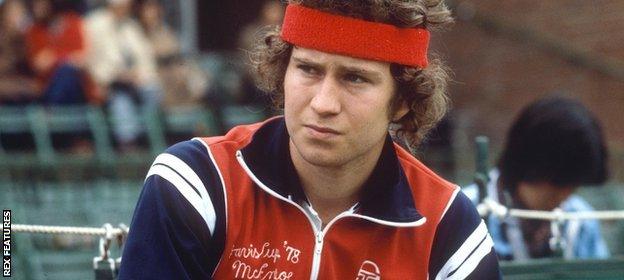
McEnroe was "in a different league" as he led the United States to victory in the final
'Nothing compares to representing your country'
Although the final ultimately ended in disappointment, Hutchins and the Lloyds look back on Britain's Davis Cup run of 1978 with immense fondness.
"You had a vast mix of characters: Mark Cox from Cambridge University; David Lloyd - the never-say-die guy; the playboy of the late '70s in John Lloyd being such fun and then you had Buster, who was the straight Englishman right out of a novel," Hutchins reflected. "We didn't necessarily love each other but we all got on."
David Lloyd became a hugely successful businessman, founding the chain of leisure clubs that bears his name, but says nothing compares to representing your country.
"It meant everything - to me anyway," he said. "At the beginning of the tie they say 'David Lloyd, Great Britain' and your name was never mentioned again. It was 'Game, Great Britain'. There is nothing in life that can give you that same feeling."
According to John Lloyd: "Sometimes it got a bit niggly and a bit volatile but, overall, the memories were damn good ones. It was a big highlight of my career, probably the number one."
As for Mottram, who declined to be interviewed for this article, he remains a largely reclusive figure, occasionally making headlines over his strident opinions and political views, such as when he tried to broker an electoral pact, external between UKIP and the British National Party in 2008.
His achievements as a tennis player - reaching 15 in the world rankings and amassing a 31-10 winning record in the Davis Cup - are often overlooked.
"Because Buster was extremely quirky, to put it mildly, and didn't want any kind of publicity, after he stopped playing he very quickly disappeared off the radar of British tennis," said John Lloyd, who will be part of the BBC's coverage of this week's final in Belgium. "That is sad."

David Lloyd, Buster Mottram and Mark Cox are all smiles before the 1978 final
Hutchins, formerly head of men's tennis in Britain and now tournament director of the ATP Nottingham Open, believes Mottram was almost as important to his squad as world number two Andy Murray is to the current team, led by Leon Smith, who will attempt to go one better on the Ghent clay.
"Andy is the talisman of our team now and I was very fortunate that I had Buster Mottram as the talisman of our team," he added.
"Buster was quite an enigma of tennis but he had these traits in him that you can see in Andy - doggedness, cussedness, never wanting to lose. All the opponents hated playing him. He used to hate losing a point. He was very intense and hard on himself.
"Once we got him back, he was the most amusing guy. Great Britain has a lot to be thankful to him for."
Watch the Davis Cup final live on BBC One and Two and listen to live commentary on BBC 5 live and 5 live sports extra on Friday 27, Saturday 28 and Sunday 29 November.
- Published26 November 2015
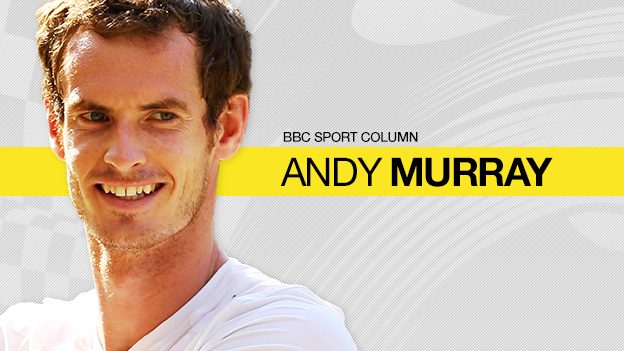
- Published8 November 2016
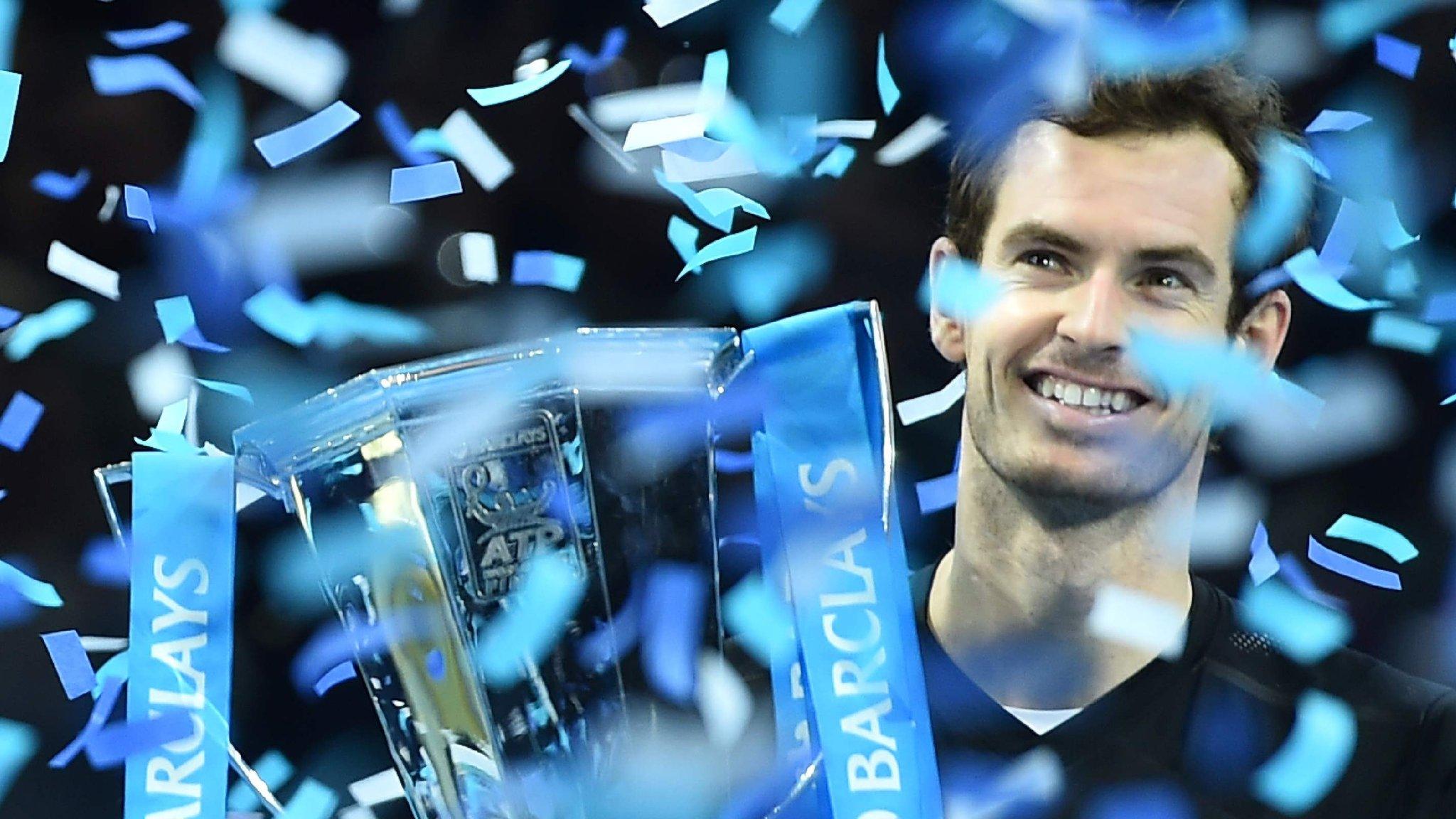
- Published17 June 2019
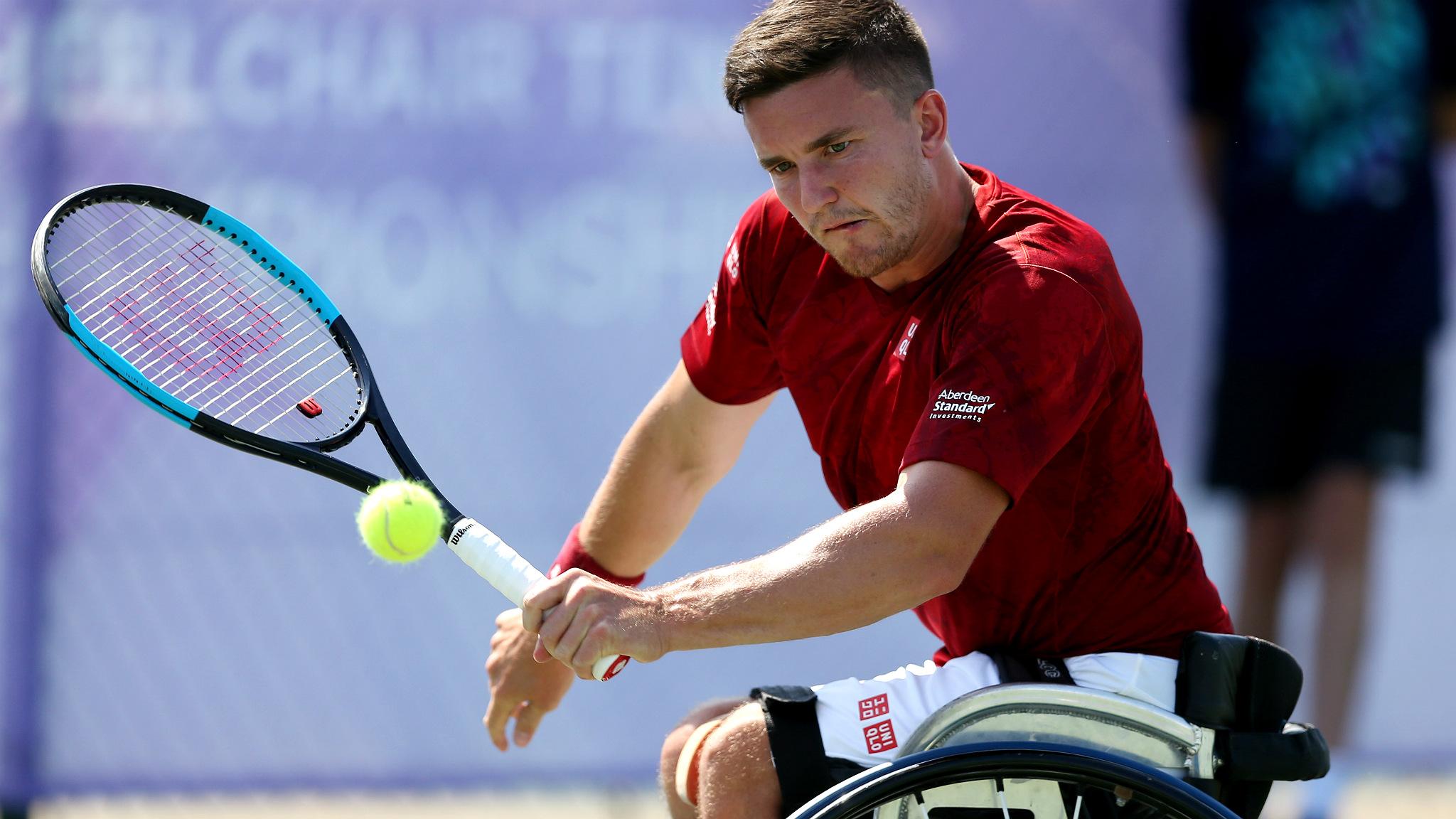
- Published19 July 2016
